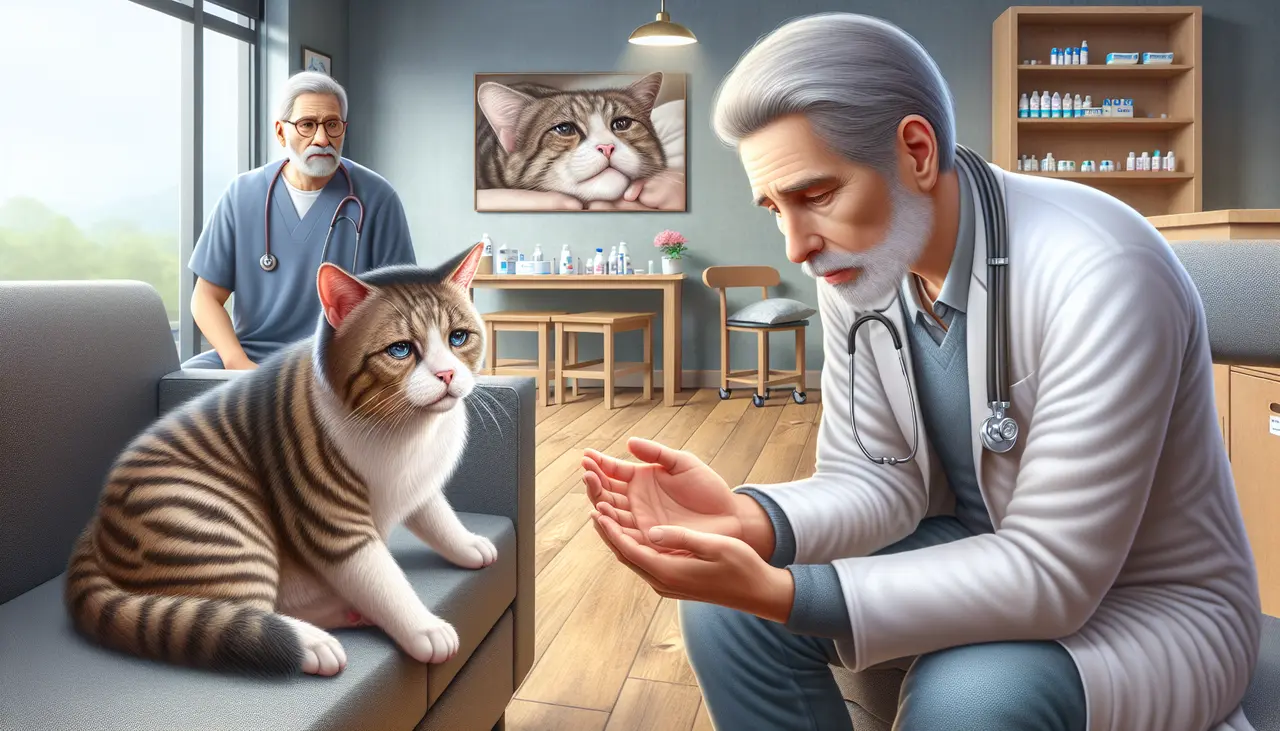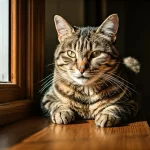Introduction to Senior Cat Care and Behavioral Changes
Caring for a senior cat comes with its unique challenges, including changes in behavior that might seem puzzling at first. As cats age, just like humans, they go through physical and mental shifts. These transformations can lead to them acting out of character. Maybe your once cuddly cat now prefers solitude, or the energetic kitty you knew barely chases after toys. Understanding these changes is the first step in providing the care your aging feline friend needs. It’s about more than just adapting their environment or diet; it’s about tuning into their needs and ensuring their golden years are comfortable and joyful. Recognizing the difference between normal aging and signs of illness is crucial, as both can influence behavior. This introduction aims to navigate the waters of senior cat care and the behavioral shifts that come with it, preparing you to tackle the challenges with knowledge and compassion.
Identifying Common Behavioral Changes in Senior Cats
Senior cats are like folks getting on in years; they start acting a bit different. You might notice your old cat isn’t as keen on play-fighting as before or maybe they’re talking (meowing) more, or less, or at odd hours. It’s all about what’s normal for your cat – any big shifts in how they act can be signs they’re entering their golden years. Here’s the rundown:
- More ZZZs: Old cats love their nap time, even more than they used to. If your furball is spending more time in dreamland, it’s pretty standard senior cat behavior.
- Talkative or Silent: Changes in how much your cat meows or at what times can be a hint they’re feeling their age. It might be they’re feeling sore, confused, or just want more of your attention.
- Mood Swings: Just like humans, senior cats can become a bit grumpy or suddenly seem scared of things that never bothered them before. It’s often because they’re not feeling top-notch or their senses aren’t as sharp as they used to be.
- Love Me, Love Me Not: Your once cuddly kitty might now prefer a bit of alone time, or if they were more of a lone ranger, they might suddenly want cuddles 24⁄7. Changes in how much attention they want can be a big sign of aging.
- Not Playing as Much: When the toys don’t seem as exciting to your cat as they used to be, it’s not just boredom. As cats get older, just like us, they might not have the energy or feel well enough to engage in play.
Remember, these shifts don’t automatically mean something’s wrong, but they’re your cue to pay close attention. Old cats need that extra bit of love and understanding as they adjust to their senior years. Keep an eye out, and you’ll both navigate this time like champs.
Understanding the Causes of Behavioral Changes
Senior cats often start acting differently as they age, and it’s not just a quirk of getting old. There are real reasons behind these changes. First off, think health issues. Just like humans, cats can suffer from problems like arthritis or thyroid issues, making them act out of character. Pain can make them grouchy or less active. Secondly, consider sensory decline. Losing their sight or hearing can make your cat more anxious or scared. Lastly, don’t overlook cognitive decline. Yes, cats can experience a form of kitty Alzheimer’s, leading to confusion or changes in behavior. Understanding these causes can help you be more patient and find ways to help your senior cat adjust.
The Importance of a Veterinary Check-up for Senior Cats
Senior cats often show changes in behavior, which could signal health issues. It’s vital to not just shrug these off as simple signs of aging. Just like humans, cats can develop various health problems as they get older, such as diabetes, kidney issues, or arthritis. Taking your senior cat for regular veterinary check-ups is essential. These check-ups can catch health problems early, making treatment more effective and possibly extending your cat’s life. During a vet visit, the vet will do a full check, including blood tests and physical exams, to spot any problems. Keeping an eye on your cat’s health through regular vet visits is a key step in ensuring they have the best quality of life in their senior years. Remember, early detection is always better for managing health issues.
Adjusting Your Home Environment for a Senior Cat
Making your home more comfortable for a senior cat involves simple changes. First, think about easy access. Senior cats might not jump as high, so place beds and litter boxes on the ground or on low platforms. Soft bedding can help ease joint pain, offering a cozy spot for your cat to rest. Next, consider warmth. Older cats love warm spots, so ensure there’s a sunny window ledge or a soft blanket in a cozy corner, especially during colder months. Quiet is key too. Senior cats appreciate a peaceful environment, so set up a quiet, tucked-away space away from loud noises and household hustle. Lastly, keep essentials within paw’s reach. Food, water, and litter boxes should be easily accessible, minimizing strain on their aging bodies. Simple steps, big comfort for your senior cat.
Nutritional Needs and Diet Adjustments for Senior Cats
Senior cats aren’t just older; their bodies are changing, and so are their nutritional needs. As cats hit their senior years, usually around 11 years old, they might start losing muscle mass. This means they need a diet rich in high-quality protein to help maintain that muscle. Unlike kittens or younger adult cats, seniors might also face challenges in digesting fats, so it’s essential to adjust their diet to include easily digestible fats.
Hydration is another critical factor. Older cats can be more prone to kidney issues, making water intake crucial. Some might not drink enough water, so incorporating wet food into their diet or even broths can encourage better hydration.
Here’s the thing, not all senior cats are the same. Some might gain weight while others lose it. Monitor your cat’s weight and body condition, adjusting their calorie intake accordingly. A lighter, leaner diet benefits those gaining too much weight, focusing on maintaining lean muscle rather than fat storage.
Remember, each cat is unique. While keeping these general guidelines in mind, it’s vital to work with your vet to tailor the diet to your senior cat’s specific health needs. Aging might be inevitable, but with the right nutritional support, your cat can enjoy their senior years with vitality.
The Role of Exercise and Play in Senior Cat Care
Keeping your senior cat active through exercise and play is crucial. As cats age, they might not zoom around the house as they used to, but they still need movement to keep their joints flexible and to manage their weight. Simple activities can make a big difference. Try introducing gentle play sessions with toys that encourage them to stretch and move, like lightweight balls or feathers on a string. Regular, short playtimes can help maintain their physical health and stimulate their mind. Remember, it’s not about the intensity but the consistency. Also, consider puzzle feeders to combine mealtime with a mental workout. Keeping your senior cat engaged and active is a key part of their care, supporting both their physical and emotional well-being.
Stress Reduction Strategies for Senior Cats
As senior cats age, they can get stressed easily. It’s crucial to keep their environment calm and stress-free. First, create a peaceful space. Senior cats cherish quiet spots where they can rest undisturbed. Ensure their bedding is soft and located in a calm area. If you have other pets or children, teach them to respect your cat’s space. Regular vet check-ups are a must. Health issues can cause stress in senior cats, so catching any problems early helps reduce stress. Adapt their environment. As cats grow older, they might find it hard to jump or climb. Place their food, water, and litter box on the ground level to make life easier. Lastly, stick to a routine. Cats love routine. Keep their feeding, grooming, and playtime schedules consistent. By following these strategies, you’ll help reduce stress in your senior cat’s life, making their golden years more comfortable and happy.
When to Seek Professional Help for Behavioral Issues
When your senior cat starts acting out of sorts, it’s natural to worry. Not every change means trouble, but some shifts in behavior call for expert advice. Here’s when to dial up the vet. If your cat suddenly gets aggressive, hides more than usual, or stops using the litter box, something’s up. Changes in appetite or how much they drink are red flags, too. Also, if your cat seems confused, has a hard time moving around, or changes their sleep habits drastically, professional insight is key. Don’t wait too long. Catching problems early often leads to a better outcome. Remember, these changes could hint at health issues, not just age. So, when in doubt, check it out.
Conclusion: Supporting Your Senior Cat’s Well-being
As your feline friend enters their golden years, it’s crucial to support their well-being with patience, love, and the right care. Remember, changes in behavior are not just signs of aging but could indicate health issues. Regular vet visits are key to keeping your senior cat healthy. Adjust their environment to make it senior-friendly—think about adding more comfortable resting spots and ensuring their litter box is easily accessible. Diet and exercise are still important; keep them moving with gentle play. Most importantly, give them plenty of attention and comfort to let them know they’re loved. Supporting your senior cat’s well-being is about adapting to their changing needs and ensuring their quality of life remains high. With your care, your senior cat can enjoy their twilight years comfortably and happily.

















